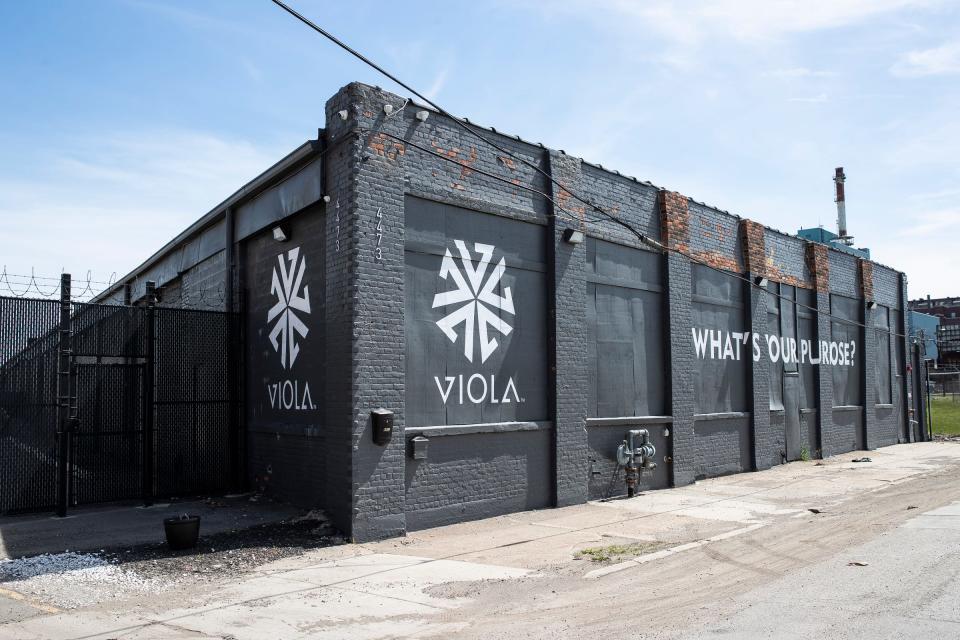‘It’s defeating’: As Detroit dispensary closes indefinitely, CEO shares biggest reason why
Former NBA player Al Harrington made a big bet on Detroit, choosing the city as the location of his national cannabis company Viola's only cannabis dispensary.
About four years after the medical marijuana retail store opened, 4473 W. Jefferson Ave., on Detroit's riverfront just west of downtown, he's suspending operations indefinitely in Michigan. Viola also has a marijuana grow facility in Detroit next to the store, which grows marijuana plants for Viola products sold around Michigan.
Many of the reasons behind Harrington's decision to suspend all operations in Detroit are common issues other cannabis companies share: Profit margins on products have declined as prices of cannabis products dropped significantly over the last few years. Declining medical marijuana sales mean cannabis companies without licenses to sell recreational marijuana are likely struggling.
But the biggest blow to Viola — and one that Harrington believes other cannabis companies are experiencing — is that the company's insurance provider, Obsidian Specialty Insurance Co., has refused to cover several claims Viola has made in the past year, including one made when the power went out at the Detroit facility during an ice storm in February that also knocked out power to about 700,000 Michigan residents and businesses. Many of Viola's marijuana plants died as a result.
"When the people that are supposed to be there to support us — that we actually pay to do a job for us and to provide a service — they don't do it, it’s tough," Harrington said. "It's defeating."

A leak from a snowstorm that damaged products at Viola's facility, also in February, and a theft in October, led Viola to file three insurance claims totaling $8.9 million.
Obsidian Specialty Insurance Co. declined to comment for this story.
Harrington talked to the Free Press last week about what led to his decision to suspend operations in Michigan, the challenges companies in the cannabis industry face and what to expect from Viola moving forward.
The interview has been edited for length and clarity.
QUESTION: How have things been going at Viola since we last talked nearly two years ago?
ANSWER: At a high level, we've definitely changed our business model in regards to cultivating in every state that we're operating in (Viola sells products in Arizona, California and Colorado, among several other states). (We're) starting to adjust to a more asset-light model, which means finding strategic partners throughout the country that we give our genetics (the specific characteristics of cannabis plants) to, to grow to our specifications ... and then package it for us. Then we go out and we do the last mile. We're helping with the distribution and marketing and sales for the product. We've been able to do that with a couple of some bigger partners — bigger multistate operators — and some smaller partners in certain states as well. It's been working out pretty good for us.
More on Viola: NBA star Al Harrington picked Detroit for Viola's only dispensary. Its future is unknown.
More on the cannabis industry: Michigan's cannabis industry turns 5 this year: What to expect
Q: Why did you want to move to an asset-light model?
A: I'm trying to grow not just a national brand, but a global brand. When you're doing that, you realize you can't be everywhere at all times. The toughest part of this industry, honestly, is the operations side of it. When you’re running these facilities, and even the issue we’re having with the insurance company now, we deal with this pretty much in every single state at some point. So it's never (that) things go as planned and perfect. When you think about it from that perspective, you have all the different operations around the country, and you got lights going out here, a storm going here, you got infestations here, so many different things. After a while, you just kind of get to the point where you got to just think, "How do you scale? How do you scale a lot faster, while being smarter about it?" What I realized is there are so many companies that have spent even more millions than I have into infrastructure, into operations in these facilities to cultivate and manufacture. I just felt like I didn't want to continue to do that with my time. I wanted to continue to be an advocate, continue to be innovative around products and packaging and continue to do my hunts in regards to trying to find genetics that'd be very specific to the Viola brand.
Q: What's happened in the last few years with your Michigan operations?
A: So the dispensary — we’ve never been able to realize its full potential because we weren't able to get a recreational license in both rounds. (Detroit made available a specific number of recreational marijuana licenses at two different periods.) We missed by points (with the scoring) and the second time we had an issue with submitting the application when the application site went down and then we missed the (deadline). So we just had a little bit of bad luck. I don't think there are any medical dispensaries in the state that are doing well — there is probably one or two — but you needed to be able to get an adult use (license) in the city of Detroit. We probably turned down anywhere from 10 to some days 30 customers that would come in wanting to buy adult-use, but we were still medical (and required a medical marijuana card to purchase products). By us not getting that (adult-use license), the store was just very stagnant. We were just pretty much making just enough money to pay our staff that was working in the store. But as far as with the brand ... we couldn’t grow enough of it.

Q: A few months after you found out Viola didn't get a recreational marijuana license from the city of Detroit, the February ice storm knocked out power at your facility. Can you tell me more about what happened?
A: The first storm that happened knocked out the lights, fried the circuit boards, all these different things. When the plants can't receive light, everything is put at risk. Plants get sick pretty fast. A lot of plants died out.
Q: So you filed a claim with the insurance company, and then what happened?
A: I feel like we've been getting the runaround. We've had adjusters. We hired our own third-party people to work with us. When we sent the insurance company a claim one time, instead of them responding, they had an attorney respond back to us. So to me, these are just things that let you know they are pretty much setting up a position for them where they will not have to pay on these claims. An adjustor was in (the facility) measuring stuff with a red beam and he put in on my aunt and she jumped and he said, 'Oh I'm not going to shoot you.' It was so unprofessional. This is the cannabis industry that we've always talked about. It's a very tough industry to navigate and work your way through. The professionalism, to me, is not always there.
Q: Where do things stand with the insurance company now?
A: They sent us a letter saying that all of our claims have been denied. Pretty much they're just saying, "Take us to court and we'll figure it out in court." So, that's what we're going to do.
Q: When did you make the decision that you can't keep operations going there?
A: It was at the end of the year (2023). The lights weren’t running at full capacity because of the circuit breakers that we didn't have the money to actually go and fix. We couldn't produce the quality of product that we needed in order to keep the business operating, honestly. It was almost like the perfect storm. Vendors not paying, all these different things. We didn't have the cash to be able to continue to just float these things like we may have in the past. We need our insurance company to do what we pay them to do.
Q: What are the potential outcomes for your operations in Detroit?
A: I’ve really grown to love Detroit. I really want to have my brand there. The support that we got from the community was amazing. So now I’m just looking at different opportunities with this asset-light model, potentially working with another cultivator until we could potentially get our building stood back up. Maybe we end up going into another building. Our licenses are still good and relevant. So one of the key components is hopefully getting some resolution around this claim. That could be a good starting point for us to make whatever investment is necessary to keep our brand alive in Michigan.
Contact Adrienne Roberts: amroberts@freepress.com.
This article originally appeared on Detroit Free Press: As Viola dispensary in Detroit closes indefinitely, CEO explains why

